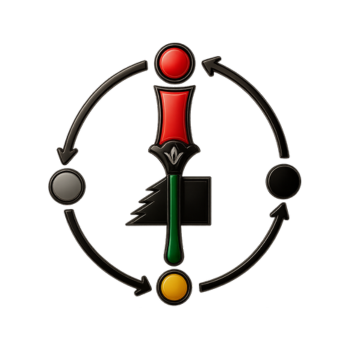-
Kgomo go tsoswa e te tekago”
That’s a Sepedi/Setswana/Sesotho proverb. Kgomo is cow. Most often a cow is used as and equated to a human being. This is because cows don’t go alone – there is always a human being along with them. A cow and a human being are inseparable. If a cow has trouble standing up, we only help the one that tries to stand up on its own, otherwise we kill it right there where it is. I don’t want to sounds rude but the saying means (by way of example) if Neter Neb opens a youtube channel and call it Kedika, you better help join in so you can be taught how to read, write and respect your data, which is your history, your lifeline, the only thing that is preventing you as a people, Black People, to be extinct. Or if Dr. Kambon teaches you scientific method of (language) reconstruction that respects the order of operations, you better try to do exactly that, failing which we kill you, right there where you stand, because you are failing to try, to mention but a few. But that’s not my question.
My question is: is there anywhere where the saying (above) is attested? I assume I understand the word “attest” until further notice. Mathematically I am allowed to make an assumption provided I will later validate my assumption after the fact. It is called Proof by Induction, in Mathematics, and it’s scientific.
Sorry for complaining.
Thanks
A cow is very heavy to pick up. If a cow doesn’t stand up

 NonMwenSe, Adjoa Malaika Gathoni and Kwabena4 Comments
NonMwenSe, Adjoa Malaika Gathoni and Kwabena4 Comments-
So “kgomo go tsoswa e tekago” literally
means, “If a cow falls, and if it doesn’t try to get up by itself with (human) assistance, you kill it right there.”
If that’s true, I don’t see nothing wrong with it. If you are helping him/her up and he/she is not budging, it’s not trying to get back on its feet, then you got to do what you got to; either leave it there and continue on with your path (with the other herds of cows) or kill it to rid him/her out of its misery.
It’s a great proverb to follow.
-
Yes. Unfortunately English doesn’t have everything a human needs to use it in translations. But, direct translation is “a cow go wakeup the one that tries to”. I don’t know how to transcribe “go”. Or should i say “a cow we help the one that tries to”. The proverb actually applies to people and cows alike. A cow is used as a metaphor to mean “a human being is as heavy as a cow”. So, yes. We kill it, or him, or her. Literally. We cant leave it there. We have to kill it and do what we do best with it, or him, or her. Literally.
-
Ok. Got it. So it’s something similar to ‘god help those who help themselves’ or ‘help those who help themselves.’ But I like the Zulu proverb better; because it gives us the solution on what to do for those who don’t want help, those who don’t want to get back up on their feet. You kill him, or her, or them, or it right there, where they are lying and do what best with him/her/it; and continue on your journey.
I really love this proverb. Going to start using it.
The Akan’s also has a similar proverb, “Woforo dua pa a na yepia wo,” meaning “It is when you climb a good tree that we give you a push.” It is a symbol of support for good causes.
-
The Akan’s also has a similar proverb, “Woforo dua pa a na yepia wo,” meaning “It is when you climb a good tree that we give you a push.” It is a symbol of support for good causes.

 2
2
-
-
-

